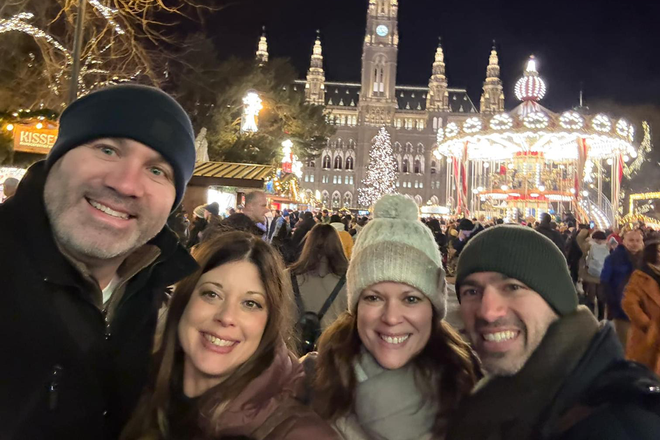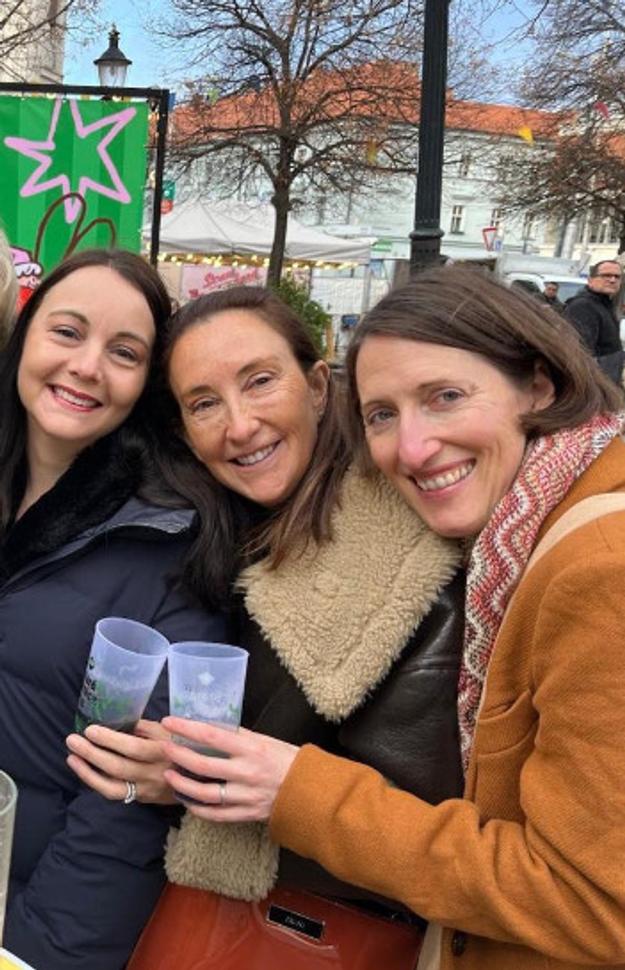Eva Staronova is a founder of a non-profit cultural and educational exchange organization in New York, NY, and an entrepreneur in the natural product industry with her company based in Los Angeles, CA. She is also a board member and Fundraising Coordinator of the International Women’s Club of Bratislava.
As we step into a new year filled with fresh ideas and aspirations, it’s also a moment for reflection. To honor this spirit, I invited some fellow-members of the International Women’s Club (IWCB) to share their unique holiday customs. From Ukraine to the United States and Cyprus, these stories showcase the rich diversity of festive celebrations while reminding us of the universal joy that brings people together.
Valentyna Prashchuk, Ukraine
“For Ukrainians, Christmas is one of the most beloved holidays. Children eagerly await gifts from Saint Nicholas, while adults take joy in preparing and sharing gifts with family and friends. Families save up to create a festive table with specialties like kutia (a ceremonial grain dish with sweet gravy), fish, bigus (a stewed cabbage dish), salads, bread, and a variety of meats.
On Christmas Eve, we gather at the grandparents’ home, where the tree is adorned with tinsel, garlands, sweets, and a shining topper. Beneath the tree, a nativity scene honors baby Jesus. An extra place setting at the table symbolizes an invitation for the spirits of our ancestors to join us. A family member leads a prayer, lighting a candle before we sing koladky (carols). It’s a beautiful time of togetherness and tradition.”
Denise St. Peter, USA
In the United States the Christmas season kicks off after Thanksgiving. People often send Christmas cards to loved ones as a way of reconnecting and spreading joy. Children send letters with their gift requests to Santa early in the season so that they have time to make it all the way to the North Pole where Santa and his elves live. Santa decides whether or not you’ve been naughty or nice. If you’ve been naughty, you may get coal in your stocking on Christmas Day and the children who are nice receive gifts (but really all children receive gifts). Families decorate Christmas trees to elevate the festivities.
As the big day draws near, families often bake Christmas cookies and sometimes exchange them with loved ones . Kids also have fun assembling gingerbread houses.
On Christmas Eve night, children leave cookies and a note for Santa (and maybe a snack for the reindeer since they work so hard guiding the sleigh around the world to help Santa deliver gifts). Santa usually arrives on Christmas Eve so that children wake up on Christmas Day with wonderful gifts under the tree as well as filled stockings. Big family dinners usually accompany both Christmas Eve and Christmas Day and both days include family, friends and festive celebrations usually incorporating Christmas music, games, Christmas movies, etc. It’s a joyful time of the year!”
Vivi Paraskevi Tsaparidou, Cyprus
“We may not have snow during Christmas (“Christougenna” in Greek) but it is surely a festive place to be with warm family traditions and delicious food.
For Cyprus, the season is in full swing by December 6th, the Feast of St. Nicholas, and lasts through January 6th, the Feast of Epiphany, or Phota. Phota is one of the most important Greek Orthodox religious celebrations of the year. New Year’s day, known as St. Basil’s Day in Cyprus, is the day that Cypriots exchange seasonal gifts. Children of all ages eagerly await the arrival of Saint Basil (AyiosVassillis) who celebrates his Name Day on New Year’s Eve, and who brings gifts of happiness and prosperity. Most families bake a special cake, Vasilopitta. The cake is always cut by the head of the family on the New Year’s Day, in the presence of all family members, to bless the house and bring good luck for the New Year. A coin is wrapped and hidden in the cake.
My favorite holiday memories are always when the whole family gets together, either in Cyprus or in any country we currently live in. The grown-ups sit around the table eating, drinking and talking for hours. The children play with their cousins and enjoy their new presents. This is happiness!”

 Denise St. Peter feeling festive with the visiting family members (second from the right) (source: IWCB)
Denise St. Peter feeling festive with the visiting family members (second from the right) (source: IWCB)
 International Women’s Club of Bratislava member Valentyna Prashchuk (source: IWCB)
International Women’s Club of Bratislava member Valentyna Prashchuk (source: IWCB)
 Denise St. Peter feeling festive with the visiting family members (second from the right) (source: IWCB)
Denise St. Peter feeling festive with the visiting family members (second from the right) (source: IWCB)
 IWCB members lifting their cups high to celebrate the holiday spirit (Vivi Paraskevi Tsaparidou on the left) (source: IWCB)
IWCB members lifting their cups high to celebrate the holiday spirit (Vivi Paraskevi Tsaparidou on the left) (source: IWCB)